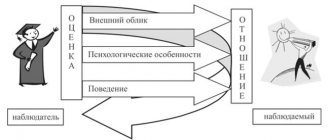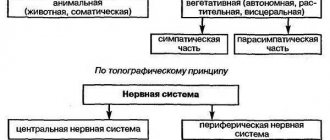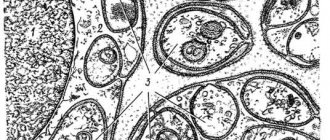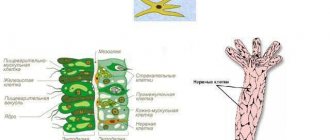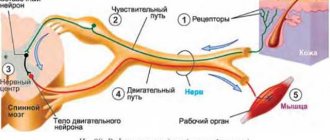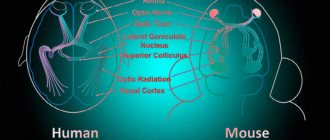Forms of nervous exhaustion
Many factors influence a person's state of mind. When entering society, people are exposed to physical and psychological stress. Nervous overstrain for a long time leads to depletion of nerve cells and the development of psychological diseases. Patients often do not suspect that the situation is out of control and medical attention is needed.
Depending on the severity of the disease, mental disorders take different forms:
| Forms of nervous disorders | Signs |
| Neurasthenia | A depressed state that lasts for a long time. The cause may be a stressful situation. Patients begin to experience insomnia and headaches, and their ability to work decreases due to bad mood. A depressed state makes it impossible to concentrate. Outbursts of aggression can abruptly give way to complete apathy. |
| Anxiety disorder | A person is haunted by possible critical situations that have not yet occurred. It seems to him that a loved one may change or an incurable disease will arise. Anxiety disorders are often caused by phobias or fears of something inevitable. |
| Depressive state | Depressive disorder can be confused with a state of sadness. Depression differs from the state of sadness in that the patient begins to become completely apathetic to what is happening around him. Everything that previously seemed important and necessary loses its meaning. The future seems bleak and there is no reason to be happy. Such a disorder entails insomnia or, conversely, lethargy and drowsiness. Sudden weight loss or rapid weight gain is often observed. |
| Panic attacks (panic attack) | A wave of causeless horror rolls over the person. Uncontrollable fear causes sweating, and due to lack of air it becomes difficult to breathe. In mild cases, attacks of panic disorder pass quickly and are repeated infrequently. But the person is in a state of anticipation of an attack, which always comes unexpectedly. |
| Vegetative-vascular dystonia | The autonomic nervous system coordinates the work of all internal human organs. If the system malfunctions, the body may react inadequately to normal situations. For example, trembling hands and involuntary muscle tension indicate the body’s readiness for a stressful situation, although in reality no danger exists. |
Reasons for the development of the disease
The main cause of nervous exhaustion is overwork or stress. It is important to understand here that fatigue can be physical, mental, emotional or mental. In addition, tension may arise when performing one type of work. For example, by obsessing over sports, a person discards mental stress, which can also lead to exhaustion. A deficiency of vitamins, minerals and hormones in the body can also provoke pathology. As a rule, this is a consequence of overvoltage, but in some cases it occurs due to lack of power.
Causes of nervous exhaustion in women and men
Nervous exhaustion, the symptoms of which look the same in women and men, develops slowly, since visible signs are not perceived by patients as a disease. A nervous breakdown only at first glance seems unexpected and short-lived; in fact, depletion of the nervous system begins long before its manifestation.
Prolonged exposure to one or more stressful situations on the psyche leads to continuous nervous tension and gradual wear and tear of the nervous system. It doesn't matter how much self-control a person has or his ability to get out of difficult situations.
The body is a mechanism that wears out after prolonged overload, and the nervous system is no exception. It is very important to know about the causes that can lead to nervous exhaustion in order to be able to prevent the development of the disease.
Most often, factors surrounding a person exert prolonged stress and lead to a nervous breakdown:
- Constant overwork associated with heavy physical labor.
- Activities associated with great moral and material responsibility.
- Mental overstrain at work or school.
- Financial difficulties.
- Tensions in the team.
- Strained relationships with loved ones or relatives.
- Breakdown of relationships between spouses or partners.
- Problems with personal relationships.
- Death of a loved one.
Stress is not always caused by unpleasant events. A stressful situation that provokes nervous tension can be considered moving to a new place of residence or the birth of a child.
What is nervous system exhaustion?
Nervous exhaustion is just one manifestation of stress. It can arise in each of us as a response to emotional upheavals, unpleasant (or even very happy) events in life, fear, fatigue, and physical exhaustion.
1. Rapid heartbeat.2. Intense, frequent sweating.3. Feeling of "inner trembling", or trembling in the voice, hands or legs.4. Increased irritability.5. Frequent and causeless (as you may think) headaches.
Nervous exhaustion is a psycho-emotional state of a person, which is characterized by complete devastation, depression and indifference to the environment. This pathology occurs as a result of severe physical or emotional stress (for example, preparing for competitions or exams) or stress (problems at work or in your personal life). Exhaustion of the nervous system is becoming more common, which is due to the crazy pace of life and the increased demands people place on themselves and on others.
This condition (especially in chronic form) cannot pass without leaving a mark on the patient’s mental and physical health. Therefore, new diseases and pathologies are increasingly being diagnosed against the background of nervous exhaustion - gastritis, insomnia, depression, apathy, paranoia and much more. To avoid such negative consequences, it is important to know how the pathology manifests itself, what its characteristic features are, when you should see a doctor and what treatment methods can be used. It is important not to delay the visit to a specialist - this will increase the chance of a favorable outcome of the disease.
Symptoms indicating nervous exhaustion
Many people prefer not to advertise all psychological stress, but to keep it to themselves. You can guess about an approaching nervous breakdown by observing symptoms indicating internal tension.
Increased irritability
Nervous exhaustion, the symptoms of which in women are often associated with pregnancy or the approach of menstruation, is accompanied by frequent mood swings. Increased irritability is one of the first signs of nervous system overload.
Outbursts of anger are caused by ordinary things that were previously ignored. A negative reaction to an event is many times greater than the strength of the stimulus that provoked the emotional outburst. In men, this can manifest itself in a strong blow to the table with their fist; a woman can break dishes.
Fast fatiguability
A symptom of the approaching critical moment is severe weakness and fatigue. It is especially important to discern this symptom against the background of an absolutely healthy body. Reluctance to work is often mistaken for ordinary laziness. Fatigue sets in after minor physical or mental stress. After sleep or long rest, strength is not restored.
The precursors to this condition are usually severe stress.
Constant rush
A constant fussy state makes it impossible to concentrate on specific work. A person is in a hurry to finish one thing and at the same time grabs onto another.
The figure lists the symptoms of nervous exhaustion.
As a result of a lack of control over one’s own actions, the ability to work is reduced, and the quality of work performed deteriorates. Despite the fact that all things seem equally important to a person, due to nervous haste, the desired result does not occur. The consequence is low self-esteem.
Pain in the head and muscles
A prolonged stressful state is called prolonged stress. Against the background of prolonged stress, the production of adrenaline in the blood increases, which puts the body on alert to resist external influences. Nervous shock prompts the body to take defensive actions: fight, flee, or hide.
When the process of nervous tension drags on, a person feels aching joints and headaches. Due to tension, all parts of the body begin to ache. Muscle pain can be of different types: aching or acute. Only targeted treatment of a nervous disorder will get rid of the problem. Muscle spasms in the cervical-collar area cause headaches.
Pressing pain in the temporal and parietal region can be short-term, but recur with a certain periodicity. Sometimes patients suffer from continuous pain, which many try to relieve on their own with medications. Such symptoms require immediate consultation with a doctor, as self-medication will only complicate the situation and delay recovery.
Insomnia
Nervous anxiety impairs quality of life. With nervous disorders, a person is unable to relax and fully rest. Thoughts about the events taking place during the day do not leave the head, a tired brain thickens, and instead of resting, a person continues to accumulate negative information.
When stressed, hormones enter the bloodstream, which have a stimulating effect on nerve cells, causing insomnia.
Prognosis and possible complications
In most diagnosed cases, the symptoms of a nervous disorder can be overcome in a short time by following the doctor’s recommendations. Fatigue and fatigue can be eliminated by proper rest, taking a vitamin-mineral complex, and less often, more serious medications. The prognosis is favorable.
However, by ignoring the “bells” from your body from the internal organs, by delaying consultation with a doctor, the person himself aggravates the situation. Treatment will require more effort, and the time frame for recovery and overcoming negative symptoms will be longer. The most negative prognosis is for already existing severe depression, extreme severity of disruption of the activity of nervous structures.
Possible complications:
- intellectual persistent decline - disturbances in the activity of neurocytes leads to deterioration of memory processes, difficulty in mastering new information;
- frequent exacerbations of chronic diseases - treatment should be carried out by several doctors at once, since symptoms of gastric ulcer and insomnia may be present at the same time;
- mental disorders - require specialized treatment;
- suicide attempts - it is important to support the patient, instill in him confidence in his own strength, and give him hope for a full recovery;
- social maladjustment – problems in a team, communication with a spouse, children, loss of a job.
However, the uniqueness of the human body is that the nervous system has enormous capabilities for recovery. Having learned the symptoms of nervous exhaustion and how to recover from your doctor, the patient should be determined exclusively to win.
Consequences of mental disorder
Mental disorders, unlike physical illnesses, cannot always be quickly diagnosed, since the symptoms of nervous diseases can be applied to signs of many diseases. You should be attentive to changes in behavior in yourself and your loved ones, since many people do not consider mental overload a reason to see a doctor.
Nervous exhaustion, the symptoms of which in women and men are similar to physical diseases of the body, is not in itself considered a disease of any organs, but a failure of the nervous system as part of a general mechanism affects the health and physical condition of people.
- Blood pressure increases, which threatens the functioning of the cardiovascular system.
- Feeling feverish tremors, a mentally ill person sweats profusely.
- Lack of appetite or uncontrolled consumption of large amounts of food leads to disruption of the digestive system.
- A mental breakdown leads to conflicts at work, which can lead to job loss.
- A person begins to have financial difficulties, which further depresses an already depressed person.
- Physical condition worsens, and problems grow like a snowball.
- The future begins to look bleak with no way to improve.
- A difficult life situation forces the patient to look for a way out. Many people try to solve the problem with alcohol or drugs. Some patients contemplate suicide.
A person with mental exhaustion feels uncomfortable in society, his social position changes for the worse. For prolonged depression, regardless of its origin, the help of a specialist is necessary.
Development mechanism
- Exhaustion of the nervous system develops as a result of prolonged functioning in a stressful mode, when, in a state of stress, the central nervous system intensely sends impulses to the organs of the cardiovascular, endocrine, and immune systems (since in a state of stress, the work of these systems is a priority); as a result, other systems of the body may suffer if left without proper attention.
- Depletion of the endocrine system occurs as a result of failure after constant overstimulation under stress. The result is disturbances in the functioning of the thyroid and pancreas glands, adrenal glands, and ovaries.
- Exhaustion of the cardiovascular system is manifested primarily by instability of heart rate and blood pressure.
- The immune system protects our body from infectious and inflammatory processes; prolonged stress causes depletion of the immune system, and at the same time, a persistent exacerbation of chronic diseases, the emergence of new ones, such as candidal lesions, dysbacteriosis, skin diseases, autoimmune lesions.
- From the gastrointestinal tract, the most typical occurrence is dysbacteriosis and ulcerative lesions of the stomach and duodenum, irritable bowel syndrome.
Diagnostics
Diagnosis of psychological disorders is based on the explanations of the patient himself or his loved ones. Often the patient’s own behavior does not seem wrong to him and it becomes difficult to convince him of the need for treatment.
The main signs of mental disorders are two opposing conditions:
- Prolonged depression, which is accompanied by indifference to everything around.
- Bewildered and fussy excitement with senseless and inconsistent activity.
In any case, the patient believes that he is at the peak of his capabilities and failures lead him into severe depression, which cannot go unnoticed in his immediate environment.
Diagnosis of the disease
If you cannot overcome nervous exhaustion and its consequences on your own, you must definitely seek advice from a psychologist, psychiatrist or neurologist. The doctor assesses the patient’s psycho-emotional state based on the patient’s symptoms and complaints. To analyze a person's physical health
A number of laboratory tests and diagnostic studies are carried out:
- General blood and urine tests.
- Blood chemistry.
- Microelementary composition of blood.
- Blood testing for the presence of medications or drugs.
- EEG, ECG, conducting a study of brain activity.
Treating nervous exhaustion yourself
If a person is familiar with the signs of nervous exhaustion, then it is possible to independently apply methods to combat a psychological crisis in order to prevent a nervous breakdown.
Balance of rest and work
A nervous breakdown is a consequence of the body’s struggle with excessive fatigue from constant nervous tension. Strengthening the nervous system and maintaining working capacity with a high productivity coefficient largely depends on the correct distribution of time allocated for work and rest.
No matter how important the work is, it will not be done efficiently and on time if the body begins to overwork. Weakening concentration and absent-mindedness leads to aimless and fruitless pastime.
As a result, with large amounts of time spent, a person receives low labor productivity, which contributes to the accumulation of negative emotions. When the first signs of fatigue appear, you don’t need to force yourself to concentrate and finish the job you started at any cost. A short break from work will bring more benefits.
Any distracted activity will help relax the nervous system.
- Breathing exercises.
- Switching attention to another type of work.
- Walk in the fresh air.
- Physical exercise.
By giving the body a break, a person can be at the peak of his capabilities for a long time without harm to health.
Normalization of sleep
The main sign of nervous system overload is insomnia. When sleep is disturbed, the human brain does not rest, but continues to reproduce the events of the day, as a result of which disturbing thoughts do not leave the consciousness either day or night. To normalize sleep, you need to relieve excitement and relax. Simple procedures performed before bed will help make the process of falling asleep easier.
- Deep inhalations and exhalations while holding your breath for a short time can be done while in bed.
- Evening walks in the fresh air.
- Muscle relaxation therapy.
- 5 hours before bedtime, it is advisable to avoid factors that excite and irritate the nervous system: caffeine, alcohol, nicotine.
- Regular swimming helps restore sleep.
- A relaxing warm bath with the addition of decoctions of medicinal herbs: string, hop cones, valerian helps improve the quality of sleep.
- Herbal teas and homeopathic soothing remedies.
If measures to restore sleep do not work and the person continues to suffer from insomnia, you should seek help from a specialist and resort to more complex treatment methods.
Physical exercise
The goal of measures to restore the exhausted nervous system is to reduce emotional stress. Physical education classes will help you shift your attention and concentrate on positive actions. Features of relaxation exercises are considered to be an appropriate atmosphere and the absence of heavy force loads.
- Workouts aimed at combating stress last from 10 to 20 minutes.
- During classes, nothing should distract or irritate. For a short period of exercise, you need to provide a calm environment and eliminate distractions: a barking dog, a crying child, borscht boiling on the stove.
- Lighted candles or an aroma lamp with essential oils and calm music have a positive effect.
There are many options for comprehensive exercises to relieve stress.
You need to start with simple ones and gradually increase the load if necessary:
- Breathing is one of the few functions of the body that can be controlled. In a state of stress, a person tries to do everything faster, his breathing becomes shallow and frequent. First you need to do some breathing exercises. While sitting on a chair, you need to straighten your back and relax the muscles of your neck, arms and legs. A deep breath is replaced by an exhalation while simultaneously counting inhalations and exhalations. Having counted to 10, you need to count down in reverse order: from 10 to 1.
- Lying on your back, place a small weight (a book or dumbbells) on your stomach and spread your arms to the sides. Inhale and exhale, straining the abdominal muscles with pushing movements.
- Swing your legs.
- Squats.
- Tilts.
- You should always complete your exercises with a breathing exercise. In a standing position, while taking a deep breath, raise your arms up, and as you exhale, touch your toes with your hands.
Diet
With nervous exhaustion, issues of proper nutrition fade into the background. Symptoms of an impending breakdown include complete or partial refusal to eat, or excessive and uncontrolled consumption of food in large quantities. It is during this difficult time for the body that disturbances in the functioning of internal organs cannot be allowed.
Metabolic and digestive system disorders associated with poor nutrition will further complicate the healing process. In women, the menstrual cycle may fail due to an excess of the hormone cortisol and adrenaline in the blood, which are produced under stress.
To maintain immunity, the body needs vitamins and minerals:
- Potent sources of B vitamins include bananas, nuts, eggs and dairy products.
- To maintain vigor and efficiency, a person needs to eat protein foods: chicken, eggs, cheese. Protein foods should be supplemented with fresh vegetables, herbs and fruits.
- It is better to replace carbonated drinks with freshly squeezed juices.
- Seafood and nuts will help restore strength.
- The main enemies of a weakened nervous system and the body as a whole are alcoholic drinks, fatty and smoked foods.
- Don’t get carried away with flour products; it’s better to eat oatmeal or muesli for breakfast.
Food intake should be limited to 3 times a day. If you need to eat something during the day, you can place a bowl of cashew nuts nearby for this purpose. You can’t go headlong into extremes: fasting to lose weight or torturing yourself with physical activity. This will only harm your health. Unusual changes will become additional stress for the body.
Treatment of nervous exhaustion with folk remedies
Nervous exhaustion, the symptoms of which in women appear more clearly and earlier than in the stronger half of humanity, does not go away without a trace. At the first signs of overwork in yourself or your loved ones, you need to take measures to eliminate them. After all, the problems are not decreasing; the attitude towards them needs to change.
Folk methods and remedies can be your first helpers:
- A positive result will be achieved by drinking rosehip infusion, which, in addition to its beneficial components, has a pleasant taste. 15 pcs. Pour dried rose hips into a 0.5 liter thermos, add boiling water and leave to infuse for a day. Take 0.5 cups throughout the day. The infusion will be more tasty and concentrated if you repeat the preparation procedure again with the same fruits.
- The essential oils contained in chamomile flowers are good for calming the nerves. Pour 1 teaspoon of dry raw material into a glass of boiling water, cover with a lid and leave for 15 minutes. Take instead of tea as a tonic drink. When combined with honey, a chamomile drink helps with insomnia.
- Grind calamus root and pour 3 tsp. 500 ml boiling water. Cook with the lid closed for 15 minutes. Strain and take 2 tbsp before meals. l.
- A course of massages is excellently relaxing and has a positive effect on the nervous system.
Drug treatment of nervous system exhaustion
It is not possible to quickly get rid of nervous exhaustion, since negativity sometimes accumulates over a long period of time and represents a large volume of failures and sadness that befall the patient.
First of all, you need to eliminate influencing factors and direct a person’s energy towards the positive. There is a set of methods for this: gymnastics, proper nutrition, drug treatment. Most often, doctors prescribe antidepressants.
- Drugs that eliminate the symptoms of the disease (headaches, muscle pain, arrhythmia) with an additional calming effect. The most popular are Corvalol and Glycine. The drugs reduce psycho-emotional stress and improve brain activity. The tablets do not need to be taken with liquid; they are placed under the tongue and dissolved 2-3 times a day. The duration of treatment is 3-4 weeks.
- Strong antipsychotics are prescribed by a doctor and have many side effects. Such drugs are prescribed for serious disorders if other methods do not bring results. The drugs have an anti-anxiety, antipsychotic and sedative effect, and restore consistent thinking. Antipsychotics and tranquilizers are prescribed during the progression of the disease and in subsequent recovery periods.
- Homeopathic medicines made from medicinal plants can be bought at a pharmacy without a prescription. Their action is aimed at supporting the immune and nervous systems. Valerianahel is considered one of the most effective homeopathic medicines. The product contains medicinal herbs and mineral components that relieve nervous excitement, help with insomnia and normalize cardiac activity, without overloading the body.
Vitamins
The spectrum of influence of vitamins on the human body is wide. With nervous exhaustion, the body works at the limit of its capabilities and consumes a large amount of energy that needs to be replenished. As a result of a violation of the diet, there is a lack of minerals and vitamins that affect brain activity.
The missing substances begin to be consumed by extracting them from the internal organs.
The body's resources are depleted and asthenia develops. The main substance responsible for the normal functioning of the nervous system are B vitamins. In order to help the body recover, you must first achieve a balance between work and rest, then start taking medications containing vitamins.
The most popular means are:
- Neurovitan.
- Milgamma.
- B-50.
- Tianshi.
- Doppelhertz with magnesium and vitamins.
- Folic acid.
Diet
We are what we eat. Therefore, if you want your psyche and body to be healthy, you need to eat right - a rational and balanced diet during nervous exhaustion will become the basis for maintaining health and effective recovery from stress.
What to do?
In order for the body to effectively resist stress and other negative influences, you need to properly organize your diet and regimen.
Eating food in the morning activates protective functions in the body. It is breakfast that helps to gradually reduce the volume of dinner and reduces unhealthy snacks during the day to zero. Avoid unhealthy snacks on the go and overeating. Another component of good health and restoration of strength is consuming enough fluid.
For good health, drink at least 1.5-2 liters of water per day. Coffee and tea, juices, sweet soda, and alcoholic drinks are not included in this amount. In addition, caffeine-containing drinks (tea, coffee, energy drinks) and alcohol deplete the body's energy reserves. Treating exhaustion with energy drinks, coffee and alcohol is like treating myopia by squinting.
It is better to avoid the consumption of these drinks. The main part of the diet should be foods that increase the adaptive properties of the body and contribute to its rapid recovery. Such products include nuts, fresh berries, vegetables and fruits, fatty fish, baked or steamed, wholemeal bread and dairy products, vegetable oils, cereals, honey, herbs.
Vitamins for nervous exhaustion and complex treatment of the disease help neutralize the symptoms. In addition to the B vitamins necessary for the nervous system (thiamine, choline, niacin, B2b B6), the body requires regular intake of macro- and microelements, amino acids, vitamin E, biotin. It is recommended to reduce the consumption of fatty, salty, sweet foods and exclude mushrooms from the diet, fried and smoked meat, sausages, legumes, canned food.
Still from the film “The Wolf of Wall Street”
When you can't do without a doctor's help
Stress accompanies a person to varying degrees throughout his life. The nervous system reacts equally to positive and negative stimuli: the adrenal glands begin to actively produce adrenaline and cortisol. Depression or aggression is the body’s reaction to a malfunction of the nervous system. The average duration of a depressive state is 2-3 weeks.
By observing changes in one's own behavior, a person can provide primary assistance to himself. If you pay attention to proper nutrition in time, start taking vitamins and soothing medicinal decoctions, you can recover without additional help from a psychotherapist.
If the means used do not help and no changes for the better are observed within a month, you should urgently seek the help of a specialist. There are many methods of psychological therapy that help to get out of a depressive state without resorting to the help of powerful antidepressants.
Don't judge yourself
Your goal-setting process should include assessing the weak links in your goal chain and how to strengthen those links. Using the marathon example above, short-term goals could include testing your fitness in some way, such as the time it takes you to run one kilometer, healthy eating advice, gait analysis, body composition analysis, etc. etc.
Example:
Short-term (“smart”) goal #2: Over the next two weeks, I will run one mile within a certain time and evaluate my current fitness.
Interim goals should include repeating such checks every few weeks. This will help you understand what changes should be made if necessary. Modifying goals in this way is key to developing long-term, sustainable motivation.
Forecast
The body is able to cope with minor and short-term depressions after mild stressful influences on its own. A deep and prolonged depressive state leads to nervous exhaustion, and this is already a disease.
If treatment is not started on time, all mechanisms of the human body will suffer from nervous exhaustion: the cardiovascular system, the digestive and reproductive systems.
Although nervous exhaustion is not a disease, it should be taken seriously, as nervous breakdowns can cause great harm to health. People who lead a healthy lifestyle cope much better with stressful situations without the use of potent drugs.
You need to regularly monitor your life rhythm:
- Combine mental and physical activity with rest.
- Eat properly.
- To refuse from bad habits.
- Exercise.
- Organize your leisure time (hobbies, interests).
When the first symptoms of a nervous breakdown appear, you need to consult a psychotherapist who will help you cope with the impending problem. The nervous system, regardless of the age category of men and women, needs constant support.
Author: Vishnevskaya Galina
Treatment of the problem
Have you encountered such a thing as nervous exhaustion? The disease has synonyms: asthenic neurosis, neurasthenia, nervous fatigue, nervous weakness, chronic fatigue.
This is one of the forms of neurosis that is very common in our modern world.
Defined as a type of psycho-emotional state that occurs as a result of stress, increased intellectual or emotional stress. Nervous exhaustion (NFF) can be considered both a symptom and a precursor of major depression.
This condition negatively affects cognitive abilities, memory, physical capabilities and other biological indicators.
In general, NI prevents a person from working normally, relaxing, communicating with people – living!
Typically, the treatment of nervous exhaustion and the elimination of its consequences and symptoms is carried out in a comprehensive manner. Doctors can prescribe herbs and medications that normalize the functioning of the nervous system.
But the main thing is a qualitative change in the usual, harmful way of life.
This is normal sleep, proper rest, healthy eating, elimination of stress factors, water procedures, diet (not for weight loss, but simply eliminating harmful foods from the diet), regular vacation.
If you love and respect yourself, don’t create problems and don’t overwhelm yourself with work, then your health will not suffer.
Don't be your own enemy!
Among the causes of nervous exhaustion are past stress, post-traumatic conditions, and severe overwork. Signs of nervous exhaustion may include cognitive, psychoemotional or psychosomatic disorders. This condition requires timely treatment.
Having understood the signs of exhaustion of the nervous system, you should not delay a visit to a neurologist. For nervous exhaustion, treatment is aimed at normalizing the activity of the patient’s central nervous system.
How to treat nervous exhaustion in different people is decided by the attending physician, after examining patients and analyzing complaints.
First, you need to take tests to rule out organic pathology of the internal organs, the presence of which can cause symptoms of exhaustion of the nervous system. If the test results are normal, the doctor will prescribe medication.
The following drugs are usually prescribed:
- nootropics to improve nutrition of brain cells and normalize blood circulation;
- antipsychotics to improve the metabolic processes of brain cells;
- vitamin and mineral complexes to strengthen the nervous system;
- sedatives to normalize sleep.
It should be noted that strong drugs, such as nootropics and antipsychotics, are prescribed in exceptional cases. If you consult a specialist in a timely manner, therapy with sedatives, taking vitamins and normalizing your daily routine are indicated for the treatment of nervous exhaustion.
The usual rhythm of life is reflected in a person’s psychological state. Pay attention to the duration and quality of sleep, nutrition, rest, walks.
- A person’s well-being and mood depend on nutrition. The diet should be balanced, containing vitamins and other elements that contribute to the development of protective functions in the body.
- Go to bed only when you feel tired. Don't force yourself to sleep if your body doesn't need rest. Reading books, watching TV and other things that can be done anywhere but in bed do not contribute to deep, sound sleep.
- Take a walk in the fresh air every day without exception. Give preference to evening walks. Instead of gatherings in a cafe, go with friends to the countryside, where you can have an active and fun time. Play sports, practice yoga, swim in the pool. Physical activity calms you down and puts you in a positive mood.
Don't let work take up all your free time. Set your priorities correctly and spend your free time profitably.
In some cases, the disease requires medication. Use antidepressants only as prescribed by a doctor, otherwise you can worsen the situation and undermine your health. Such drugs dull feelings of anxiety and fear. They have sedative, hypnotic, and anticonvulsant effects.
The emotional state depends on nutrition; a lack of useful components leads to mental disorders. Regular consumption of vitamins and microelements helps improve the nervous system.
Add variety to your daily menu, which should consist of plant foods, cereals and seafood. Forget about simple carbohydrates, fatty foods, pickles, processed foods, sausages, sweets, and alcoholic drinks.
Despite the fact that nervous exhaustion is not an obvious pathology, it should not be underestimated, since this condition significantly deteriorates a person’s quality of life. Without treatment, such a disorder can harm not only the person himself, but also his loved ones - in a state of nervous exhaustion, people often commit actions, the consequences of which are disastrous.
Treatment of nervous exhaustion of the body is carried out with the help of specially selected medications - antidepressants, vitamins, vasodilators (to improve brain function). It should be remembered that treatment for nervous exhaustion can only be prescribed by a qualified specialist.
An important place in the treatment of exhaustion of the body is occupied by the preparation of the correct daily regimen. The schedule should be designed in such a way that during the day a person has time for walks, non-exhausting physical activity, rest and work. Normalization of nutrition is also important - a diet compiled in accordance with the rules of a healthy diet will improve your well-being.
It is very important to normalize sleep, and it is best if you can do without taking appropriate medications. Therefore, walks in the fresh air in the evening, meditation to relax, warm baths before bed are recommended - in a word, everything that can help you relax and fall into a deep, healing sleep.
With the modern pace of life, the desire for success, especially in megacities, exhaustion of the nervous system can occur following manager syndrome (emotional burnout) in many people susceptible to “big city neurosis.”
Therefore, in order not to bring yourself, and if you have already brought yourself to the point of symptoms of nervous exhaustion, you need to know about preventive measures and how to recover if something happens...
Let's take a closer look at what are the symptoms of nervous exhaustion in the human body and how psychotherapeutic treatment of nervous system exhaustion is carried out.
If you have nervous exhaustion, the symptoms will be as follows:
- Irritation, anger for no particular reason, often over trifles...
- Low self-esteem and self-position in life
- Insomnia - a person falls asleep for a long time, “chasing” various thoughts and pictures in his head; and/or frequent waking up at night, restless sleep, sometimes with nightmares; waking up with a feeling of lack of sleep, fatigue, weakness...
- Periodic headaches, sometimes girdling pain (the so-called “neurasthenic helmet”)...
- Sexual disorders
- Loss of strength, apathy, depression, low tolerance to frustration, stress...
- Mental, mental fatigue, weakening of memory...
- Bad mood, spiritual emptiness, pessimism, no taste for life...
- A person with symptoms of nervous exhaustion becomes impatient with expectations, overly sensitive to external stimuli (lights, sounds, smells...), uncertain and indecisive...
- The behavior is passivity, doing nothing, laziness...self-digging...
If you have nervous exhaustion, treatment should be carried out comprehensively. First of all, you need to analyze and understand the original source of the problem, usually this is an intrapersonal conflict. scenario life attitudes (deep convictions, beliefs, stereotypical thinking), which provoke you to live and work to the point of exhaustion of the nervous system and the whole organism.
Then change your thinking. internal beliefs and convictions that unconsciously direct you to self-destruction.
Next, you need to immediately start a healthy lifestyle. proper balanced nutrition, vitamins, normal sleep, proper rest, at least two days in a row a week, morning and evening walks in the fresh air, psychological and physical training. Learn to manage your time. structure it correctly: work, rest, pastime...
Engage in morning and evening relaxation (relaxation of soul and body) in order to utilize internal negatives stored in the psyche and not worked out in a timely manner (resentment, guilt, anger..., feelings of injustice...), as well as to relieve tension, stress, depression...
Using positive affirmations for all occasions or self-hypnotic techniques, raise your self-esteem, making yourself more confident and decisive... Constantly motivate yourself to succeed without undue stress on the psyche and physiology, in order to avoid nervous exhaustion of the body in the future.
Are you experiencing symptoms of nervous exhaustion? Psychotherapist online - quick treatment and restoration of the body
Do you want to get rid of nervous system exhaustion and recover on your own? Order individual psychological training
The choice of treatment for nervous exhaustion depends on the nature of the clinical picture. First of all, it is important to analyze what caused this condition and direct all efforts to eliminate the irritant.
First of all, psychologists recommend doing a little work on yourself, which will improve your general condition and get rid of negative symptoms.
Plan your day correctly, in which there must be time for rest. It is important to strictly adhere to your routine and, if possible, spend your free time outdoors.
To combat insomnia, it is necessary to avoid energy drinks and foods that stimulate the central nervous system before going to bed; exclude watching TV shows and films that evoke strong emotions (both positive and negative); go for a walk in the fresh air before going to bed. Physical exercise helps you fall asleep and stay asleep (but don’t overdo it).

